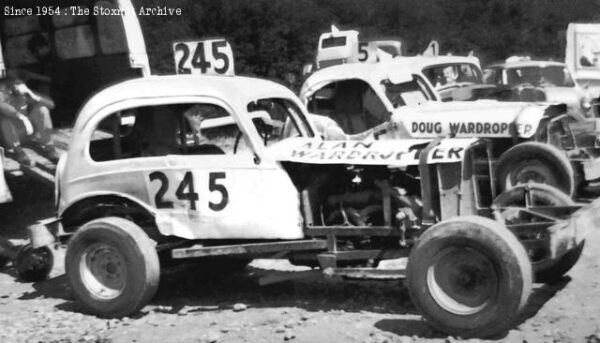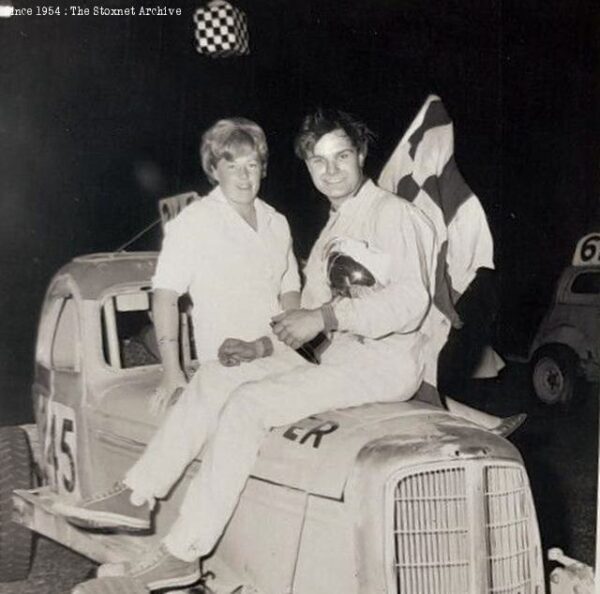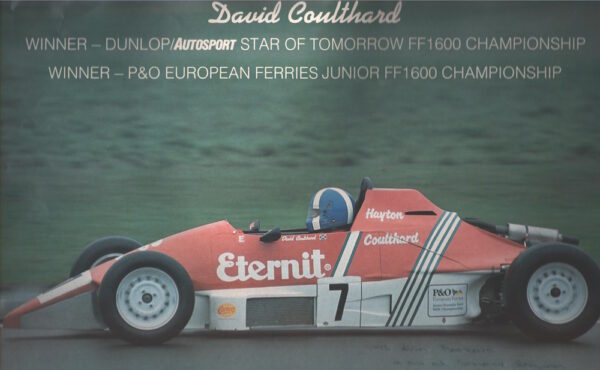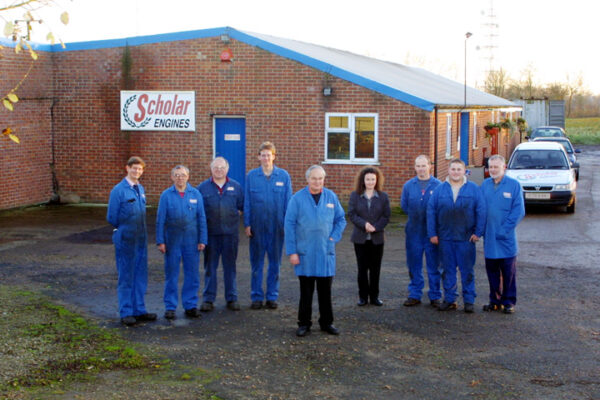HISTORY
Where it all began…
Doug Wardropper left the RAF following the second world war, and in 1950 had set up Drift Garage off Spring Road in Ipswich. In the mid 50s, Doug was doing well racing in the F1 stock car scene, and at that time his car was running a big Chevy V8 engine that needed re-boring. He took the engine to a nearby engineering firm, but after putting the engine back in the car, it soon leaked and had to be re-linered. Doug decided that he’d be as well off to do this sort of work himself, and, unknowingly, the seeds of Scholar Engines were sown.
In 1958, Dougs son Alan had joined him working at the garage, and also on the ovals of stock car racing. Alan had offers for apprenticeships at Jaguar and Humber but needed the money of a full-time job to fund his racing habit! Doug and Alan were quietly working away learning more and more about modifying and building engines, and this was paying dividends at the track. In 1959, Alan became the only driver to ever win in their first F1 stock race – on his 16th birthday.
By 1960, Doug sold Drift Garage and started up School Garage, in Otley. They installed a rolling road which was ex-USAF, that allowed them to further develop their engine tuning, and specifically at that time they produced the “Scholar Conversion” for the popular Austin Mini. The conversion took standard 850cc A-series engined Minis, and using the crankshaft from the 1098cc engine and pistons from Hillman Imp, gave a 1215cc engine. Later, Cooper would launch the 1275cc engined Mini, followed by Austin themselves.
During their time at Drift Garage, Doug and Alan continued seriously with stock car racing, and were proving to be quite successful, with numerous wins in local, national, and world championships for F1 stocks. In 1967, Doug and Alan moved over to the Spedeworth F2 SuperStox series. Then in 1968, Doug sold up at School Garage and went out to South Africa.
In September 1968, with his dad off in South Africa, Alan started up his own company, Scholar Engines. Based in the old airfield control tower of RAF Martlesham Heath, Alan became involved in all sorts of projects, however the most significant of these would come about due to the start of a new single seater race series called Formula Ford.
Alan was crowned the F2 Superstox world champion in 1969, at which point he retired from his driving career to focus on the business. A local Formula Ford competitor Richard Scott had designed and built his own ‘Centaur’ chassis, and approached Alan for a Scholar engine – a lack of funds would hinder its development, but not before a young driver called James Hunt had offered to help set it up… Alan couldn’t afford the fee!
In 1971, Tony Brise entered the Formula Ford championship, driving a Merlyn with a Scholar Engine. This was the time that Formula Ford really took off for Scholar, with engines powering front running cars for the next two decades. With the creation and subsequent success of the Van Diemen chassis in 1973 by Ralph Firman, and Scholar supplying most of the Van Diemens with engines, around 200 Formula Ford engines per year were being built.
By 1974, mainly due to the volume of work for Formula Ford, Scholar had outgrown its workshop at the control tower, and so moved to bigger premises on Hawker Drive, Martlesham Heath. Here Alan was able to grow the number of staff to help with the jobs. FF1600 continued to go from strength to strength, both home and abroad – in 1985 and 1986 Scholar built all the engines for Ford for the Formula Ford World Cup, with all the cars then being shipping to Portugal and Spain for Fords efforts to build series there. Ford had also introduced a Junior FF series, where Scholar had great success with a number of drivers who went on to have racing careers, including David Coulthard.
In 1991, Scholar moved to a new workshop at Mendlesham in Suffolk, and remain at the same location today. By this time a number of other mainstream manufacturers had got into single seat formula, where Formula Ford had pioneered as a low cost entry route to this type of racing. Scholar were now also producing engines for Formula Vauxhall Lotus, Formula Renault, and Formula Vaxuhall Junior. Other areas of work remained increasingly popular with Scholar building engines and providing parts and machining services for standard road cars through kit cars, stock cars, rallying, and others.
Today…
In 2019, Alan decided it was time to slow down a little. Having been a customer for around 15 years, Alan asked Greg if he would be interested in buying Scholar Engines. A deal was made, and Scholar changed ownership for the first time in its long history. Alan continued on a part-time basis until he finally called time in 2024, at the grand age of 80 – though he regularly calls in to see what’s going on! The subsequent years have seen numerous improvements throughout the business, but the engineering fundamentals established by Doug and Alan remain.
Scholar in Motorsport
Formula Ford 1600
Scholar Engines became renowned for its Formula Ford FF1600 engines when the series was at its peak, during the 70s and 80s. Many of our most outstanding achievements have been made in this ultra-competitive and tightly-regulated race series, with countless podiums & race wins, and numerous championships. From the very early days with the Kent engine, through the 1800 Zetec era, and into the later 1600 ‘Duratec’ engines, Scholar have produced many successful race winning engines.
Our success continues: in 2024, we were proud to be the engine supplier to 3 champions in 3 separate FF1600 Series in the UK and Ireland. With our continued development of the Ford Kent XFlow engine within the series regulations, we are building new, or refreshing existing, engines every month in 711M, 831C or AX platforms.
Formula Ford 2000
First introduced in 1975, Formula Ford 2000 was created as a bridging category between FF1600 and Formula 3. The cars feature slicks and wings, and an increase in power from use of the 2 litre Pinto engine. The change to the Pinto engine was relatively straight-forward for FF chassis manufacturers, and in its early days many adapted their existing chassis to suit. The formula rapidly gained popularity, and sat well alongside the 1600 formula through until the late 1980s when Formula Vauxhall Lotus emerged to take its place.
As with FF1600, Scholar has had many successes over the years in this category, and this continues today with the Historic FF2000 championship where Scholar engines have powered race and championship leading cars.
Rover K-Series – Autobytel Lotus Championship
Lotus Cars approached Scholar Engines in 2002 to help rectify a number of durability issues experienced in their single-make Autobytel Lotus Championship. Developed by Lotus Motorsport, the Lotus Sport Elise was based on the highly successful road car of the same name. Following improvements made to the engine, there were no further engine failures experienced during the subsequent races. Scholar went on to apply these developments for use in other applications of the K-series engine – with the ‘EVO’ conversion being used in a broad variety of vehicles from race to road use. To this day it remains the optimal solution to the issues experienced with the ‘wet liner’ cylinder construction method used by Rover.
Many of the worlds leading racing drivers have used the services of Scholar Engines during the early part of their careers, in Formula Ford, Formula Vauxhall Junior, Formula Renault, and many others. In 2002, five Formula One Grand Prix drivers on the grid, were past customers of Scholar Engines.







